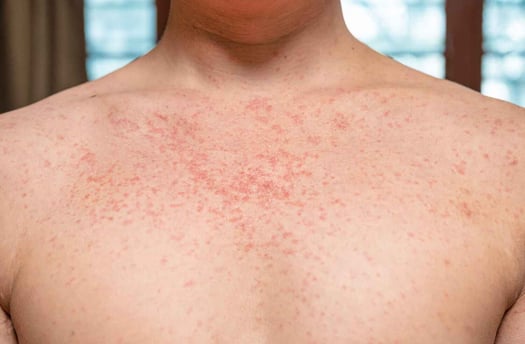Measles Outbreak
At least two dozen measles cases have been recorded in a West Texas county. It is the most recent measles outbreak of a disease that had been nearly eradicated in the United States, and it serves as a warning to communities across the country. Dr. James McDonald, the New York State Health Commissioner, discusses why this is completely preventable and how you can protect yourself.
NEWSHEALTH


What Exactly is Measles?
Measles (rubeola) is a viral ailment that causes a rash and a fever. It is very contagious and spreads via the air whenever a person with measles speaks, coughs, or sneezes. Measles does not have a medical cure; instead, it is important to let the illness develop. The measles vaccination is the most effective way to protect against measles.
Measles is no longer as common as it was before the advent of a vaccination. Measles epidemics have occurred in recent years, owing to the United States' falling vaccination rates. Vaccination rates are low in many parts of the world. This suggests that you can catch measles while traveling overseas. Individuals who have not got the measles vaccination are vulnerable to catching the disease.
Signs And Symptoms Of Measles
Usually, 10 to 14 days after viral exposure, measles symptoms show themselves. The most clear indication is a big rash.
Usually, early symptoms last four to seven days. They cover:
Among the symptoms might include coughing, a runny nose, red and watery eyes, and little white dots on the cheekbones.
Mostly on the face and upper neck, the rash shows up 7 to 18 days after contact. Over three days, it reaches the hands and feet lastly. Usually lasting five to six days, it then disappears.
Complications connected to illness define most of the deaths from measles.
Complications might comprise:
blindness; encephalitis, a condition causing brain swelling and maybe brain damage
Severe diarrhea, dehydration, and ear infections are among potential consequences.
serious respiratory problems including pneumonia.
Should a woman get measles while pregnant, it might be detrimental for the mother and cause her kid to be born early with low birth weight.
Complications are more common in those over thirty and in youngsters under the age of five. Among undernourished children, especially those without vitamin A or with a compromised immune system from HIV or another disease, they are more common. Measles also weakens the immune system and makes children very vulnerable as it leads the body to "forget" how to fight against illnesses.
Who Are At Risk Of Getting Measles?
Any non-immune person -one who has not been vaccinated or who has been vaccinated but has not gained immunity is vulnerable to illness.
Pregnant women and small children who have not had vaccinations are most prone to suffer with severe measles consequences.
Measles still remains common in parts of Asia, the Middle East, and Africa. It is challenging to immunize every kid as the great majority of measles deaths happen in nations with low per capita incomes or inadequate health systems.
While overcrowding in residential camps increases the risk of infection, damaged health infrastructure and health services in countries experiencing or recovering from a natural disaster or conflict disturb routine immunization. Youngsters with malnourishment or weaker immune systems are more prone to have measles.
Treatment Of Measles
There is no particular therapy for measles. Caregiving should be centered on treating symptoms, keeping the patient comfortable, and avoiding problems.
Drinking plenty of water and using dehydration treatments will help you replenish fluids lost due to diarrhea or vomiting. Eating a nutritious diet is also crucial.
Antibiotics may be used to treat pneumonia, as well as ear and eye infections.
All children and adults with measles should be given two doses of vitamin A supplements, 24 hours apart. This restores low vitamin A levels, which may occur even in well-nourished youngsters. It may assist to avoid eye injury and blindness. Vitamin A supplementation may help lower the frequency of measles fatalities.
Prevention Of Measles
Measles prevention is most successful with community-wide vaccinations. Every youngster should be immunized against measles. The vaccination is safe, efficacious, and affordable.
Children should get two doses of the vaccination to achieve immunity. In areas where measles is widespread, the first dosage is often given at 9 months of age, whereas in other nations it is given between 12 and 15 months. A second dosage should be given later in childhood, often around 15-18 months.
The measles vaccination is administered alone or in combination with immunizations for mumps, rubella, and/or varicella.
Routine measles vaccination, paired with mass immunization efforts in areas with high case rates, is critical for lowering worldwide measles mortality. The measles vaccination has been in use for almost 60 years and costs less than $1 per kid. The measles vaccination is often used in emergency situations to prevent epidemics from spreading.
Also Read Rhinnorhea Causes and Treatment
At least two dozen measles cases have been recorded in a West Texas county. It is the most recent outbreak of a disease that had been nearly eradicated in the United States, and it serves as a warning to communities across the country. Dr. James McDonald, the New York State Health Commissioner, discusses why this is completely preventable and how you can protect yourself.
